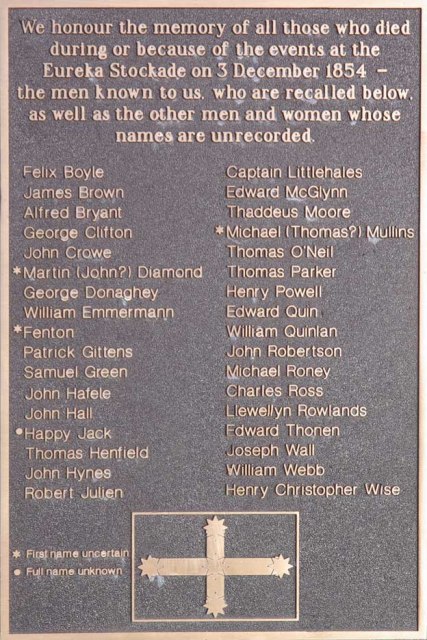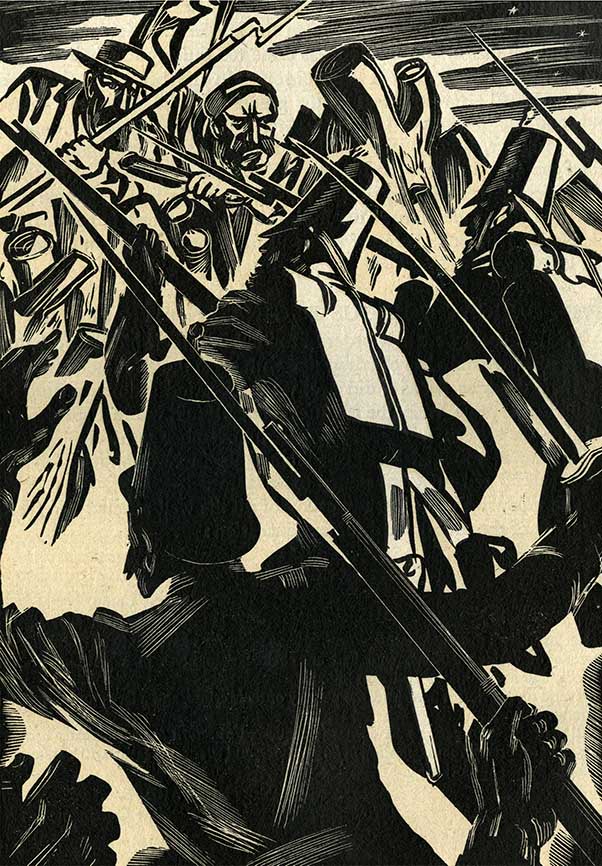Michael Roney

Memorial to those who died as a result of the Eureka Stockade located in the Eureka Memorial Park Association. Photography: Clare Gervasoni 2013.
Contents
Background
Goldfields Involvement, 1854
Michael Roney was a private with the 40th Regiment and was killed at the Eureka Stockade.
- THE MILITARY POINT OF VIEW
- A long letter, dated February 7, 1870, and signed "John Neill, late of the 40th Regiment," describing the attack on the Stockade, and some of the immediately subsequent events gives the point of view of a soldier who took part in them.
- "As a military man," he writes, "and one who took a most prominent part in all the military movements of that day, I beg leave to offer a remark upon the statement made by the Government officer of the camp. The small force consisted of detachments of the 12th and 40th Regiments, and a few troopers and foot police, the whole under the command of Captains Thomas and Wise, and a lieutenant of the 12th — I forget his name. The order to fall in and be silent was given, and when Captain Thomas had spoken a few words we were put in motion, led by Captain Wise. The party had not advanced three hundred yards before we were seen by the rebel sentry, who fired, not at our party, but to warn his party in the Stockade. He was on Black Hill. Captain Thomas turned his head in the direction of the shot and said:—
- "We are seen. Forward, and steady, men! Don't fire; let the insurgents fire first. You wait for the sound of the bugle.'
- "When within a short distance of the Stockade the insurgents fired. Captain Wise fell, mortally wounded. The same volley wounded the lieutenant of the. 12th. already spoken of, and three of his men; two killed, one wounded of the 40th—Privates Michael Rooney, Joseph Wall, killed; William Juniper, badly wounded The camp officer says the police were the first to enter the Stockade. He is wrong. There was not one policeman killed or wounded during the whole affair. When Captain Wise fell the men cheered, and were over in the Stockade in a second, and then bayonet and pike went to work. The diggers fought well and fierce, not a word spoke on either side until all was over. The blacksmith who made the pikes was killed by Lieut. Richards, 40th Regiment. Honor to his name; he fought well and died gloriously. It was rumored that at that time the police were cruel to the wounded and prisoners. No such thing. The police did nothing but their duty, and they did it well for men who were not accustomed to scenes of blood or violence- To my knowledge there was only one wounded man despatched, and he kept swinging his pike about his head as he sat on the ground. His two legs were broken, and he had a musket ball in his bcdy. He could not live, and it was best to despatch him. His name was O'Neill, a native of Kilkenny, Ireland. I heard this statement from a sergeant of police, and I knew it was correct."[1]
Post 1854 Experiences
In The News
- THE AFFAIR AT BALLARAT.
- By the courtesy of Colonel Macarthur, Deputy Adjutant-General, we have been favoured with the following official account of the rencontre of the military with the diggers at Ballaarat, on the 3rd instant :
- General Order.- No. 163. Head Quarters, Camp, Ballaarat, December 9, 1854.
- The Major-General has had under consideration the report of Captain Thomas, 40th Regiment, respecting a sharp rencontre which took place at dawn, on the 3rd instant, about one mile and half from this Camp, between a body of insurgents and part of the troops then at Ballaarat.
- The party in this affair was composed of one subaltern, and 65 of other ranks of a detachment of the 12th Regiment, under Captain Queade ; one subaltern, and 30 of other ranks of the military mounted force, under Lieutenant Hall, 40th Regiment; and one subaltern, and 87 of other ranks of a detachment 40th Regiment, under Captain Wise; together with six officers and 94 mounted and foot constabulary. Captain Pasley, the Royal Engineers. Lieutenant Richards, 40th Regiment, and Sub-lnspector Taylor, were Captain Thomas's orderly officers on this occasion.
- The force thus constituted, advanced steadily until they received the fire of the rebels, and then stormed an extensive barricade which these had for same days constructed, and held as a strong-hold.
- In their headlong flight before the vigorous assault of the troops, they met with severe and merited chastisement. Thirty are believed to have been killed, and a much larger number wounded.
- This salutary lesson to the traitors and anarchists, then banded together for the subversion of law and order has, the Major-General regrets to learn, not been effected without Captain Wise, 40th Regiment, Lieutenant Paull, 12th Regiment, being severely wounded, and the casualties contained in the subjoined list.
- Sir Robert Nickle will not fail to submit the names of the killed and wounded for the consideration of the Right Honourable the General commanding in chief, in order to their being transmitted to their respective parishes, so that friend and kinsmen may become acquainted with their gallantry.
- While here with the troops, the remembrance of these brave men will be kept alive in the sections of which they form a part. Like them, whether in splendid triumphs or in minor affairs, it is the good opinion of the officers, non commissioned officers, and pivaies to which he belongs, that every true soldier should ,seek to obtain. The Major-General considers that Captain Thomas deserved the utmost praise for the secrecy which he maintained while planning this energetic attack, as well as for the promptitude with which it was accomplished when planned.
- On an occasion when all are reported to have behaved well, both soldiery and police, it would be invidious to made distinctions ; but this much may be affirmed, that, while the troops dealt heavy blows on the insurgents, they were not unmindful of the protection of their wounded officers on the field.
- List of casualties incurred by the force under the command of Captain J. W. Thomas, 40th Regiment, in the attack on the rebel, camp at Eureka, on the 3rd December, 1854 : -
- 12th Regiment.
- Lieutenant W. H. Paull, severely wounded.
- Private William Webb, mortally ditto, since dead.
- Private Robert Adair, severely wounded.
- Private John Smith, severely ditto.
- Private Felix Boyle, severely ditto.
- Private William Buttwill, very severely ditto.
- Private Timothy Galvin, severely ditto.
- Private William French, severely ditto.
- 40th Regiment.
- Private Michael Rooney, killed.
- Captain H. C. Wise, dangerously wounded.
- Private John Bryan, severely ditto
- Private Henry Cottes, slightly wounded.
- Private William Juniper, severely ditto.
- Private Bernard O'Donnell, severely ditto,
- Private Joseph Wall, mortally, since dead.
- Private Patrick Sullivan, slightly wounded.
- By command,
- (Signed)
- E. MACARTHUR, D.A.G.[2]
See also
Further Reading
Corfield, J.,Wickham, D., & Gervasoni, C. The Eureka Encyclopaedia, Ballarat Heritage Services, 2004.
